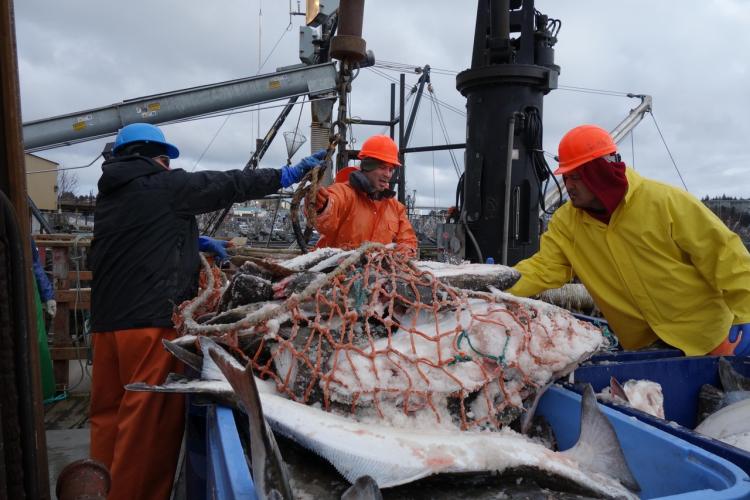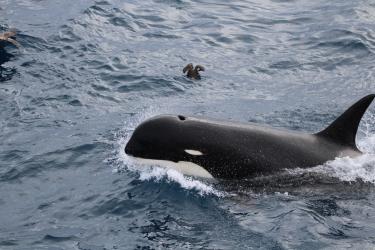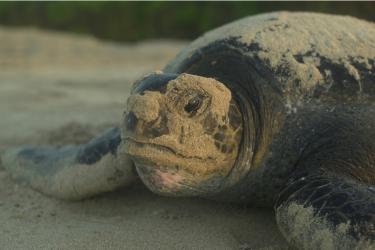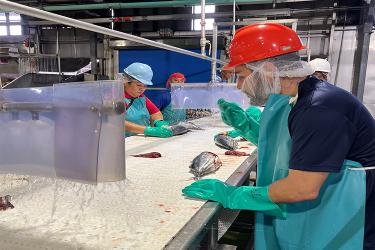CALM-CS: The Collaborative Accelerator for Lawful Maritime Conditions in Seafood
The Collaborative Accelerator for Lawful Maritime Conditions in Seafood or CALM-CS (pronounced “calm seas”) was developed to promote legal and safe working conditions throughout the fishing and seafood industry.
Illegal and inhumane working conditions in the seafood sector, such as forced labor, are devastating for the victims and their families. They can contribute to destabilization of maritime security and supply chains, as well as the degradation of fisheries and broader marine ecosystems. Left unchecked, labor abuses undermine U.S. economic competitiveness, national security, and the sustainability of marine ecosystems.
In a recent National Security Memorandum on Combating Illegal, Unreported, and Unregulated Fishing and Associated Labor Abuses, President Biden reinforced the commitment of the U.S. government to fight labor abuses in the seafood sector. He also called for agencies to increase their collaboration with non-governmental partners to develop comprehensive approaches to combat these conditions. This initiative responds to that call.
Our efforts focus on five key strategic priorities:
- Identifying best practices for industry accountability and due diligence for decent working conditions throughout the seafood supply chain
- Exploring novel sources of information, and enhancing means to share and analyze that information, to better identify illegal and unsafe labor practices in fisheries
- Reducing vulnerabilities of at risk populations to labor abuses in the seafood supply chain
- Exploring potential tools to enhance safety and labor conditions aboard U.S. vessels
- Supporting collaboration mechanisms across workers, governments, industry, and civil society to support workers within the seafood industry
The ultimate goal of CALM-CS is to make demonstrable progress across each of these areas. This progress will be achieved through clearly articulated, time-bound, and achievable deliverables. These deliverables, and any related actions, will not be government driven or regulatory in nature. CALM-CS will support action in industry, civil society, and beyond.
Who We Are
This initiative engages with stakeholders who share our commitment to end abusive practices and promote safe and legal working conditions in the seafood sector. CALM-CS is not an advisory body and will not make recommendations to government agencies or for government actions.
CALM-CS is chaired by Alexa Cole, Director of NOAA Fisheries' Office of International Affairs, Trade, and Commerce. The vice chair is Bob Dehaan, National Fisheries Institute.
Working Group Participants
Representatives from all relevant sectors—workers, harvesters, processors, retailers, brokers, NGOs, and think tanks—are engaged in CALM-CS, bringing their insight, experience, and resolve. Working group leadership includes one representative from the private sector and one from the U.S. government.
Standards/Due Diligence
Chair: Sara Lewis, Fishwise and Anne Zollner, U.S. Department of Labor
Data/Information to Identify Illegal Labor Practices
Co-Chairs: Marti Flacks, Center for Strategic and International Studies and Erika Carlsen, NOAA Fisheries
Tools to Support At-Risk Populations At Sea
Co-Chairs: Lisa Rende Taylor, Issara Institute and Laura VanVoorhees, U.S. Department of Labor
Potential tools to Enhance Safety and Labor Conditions Aboard U.S. Vessels
Co-Chairs: Matt Tinning, At-Sea Processors Association, and Elizabethann Mencher, NOAA Fisheries
Workers Voice
Co-Chairs: JJ Rosenbaum, Global Labor Justice, and Marina Colby, U.S. Agency for International Development
Moving Forward
Civil society and government have a shared role in preventing illegal and harmful labor practices in the seafood supply chain, as well as promoting legal, safe, and healthy working conditions for workers in the fishing industry. The CALM-CS initiative leverages the urgency we all feel toward these issues to engage collaborators with a results-driven focus.



